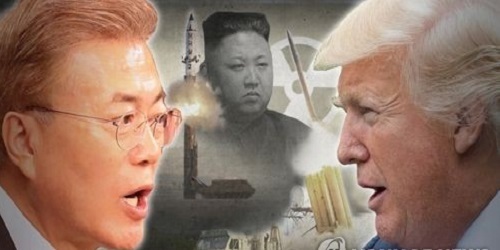US President Donald Trump expressed fury over South Korea's decision to delay the full deployment of the US THAAD missile defense system pending an environmental assessment, a senior official said Sunday.
Trump showed the reaction when he discussed the matter with Secretary of State Rex Tillerson and Defense Secretary Jim Mattis at the White House on June 8, the official told Yonhap News Agency on condition of anonymity.
The revelations, if true, raise concern that the issue could affect the first summit meetings between President Moon Jae-in and Trump set for June 29-30 at the White House, though it is not clear if it would be on the agenda.
 |
(Yonhap) |
Earlier this month, South Korea suspended the deployment of an additional four THAAD launchers pending an environmental assessment, spurring doubts in the US that the halt might be a precursor to the South ultimately rejecting the THAAD deployment altogether.
But Seoul has promised the environmental study won't lead to a reversal on the deployment itself.
On Friday, Moon Chung-in, a foreign affairs scholar serving as a special adviser to President Moon, told reporters in Washington that the environmental review is an unavoidable process for Seoul to go through if it's a democracy. He also said it's wrong to suggest THAAD is "everything about the Korea-US alliance."
The THAAD unit in South Korea became operational after the US
brought in two of a total of six launchers for the battery in early March. The remaining four launchers have since arrived in the country but have not been installed yet.
The environmental review put the installation of the four launchers on hold.
THAAD has been one of the hottest political and security issues in South Korea for years, with the US wanting to deploy the system and China putting up vehement opposition claiming THAAD's radar can be used to spy on the country.
Opposition in South Korea to the deployment grew larger as the public raised questions about decisions made by former President Park Geun-hye, who was impeached and then ultimately ousted from office on corruption charges. It was when Park was in office that Seoul decided to host the system.
Trump fueled opposition to THAAD among the South Korean public by demanding Seoul pay for the US$1 billion system. The demand runs counter to a deployment agreement under which the US agreed to pay for the system if the South agreed to host it and provide land. (Yonhap)








![[Today’s K-pop] Blackpink’s Jennie, Lisa invited to Coachella as solo acts](http://res.heraldm.com/phpwas/restmb_idxmake.php?idx=644&simg=/content/image/2024/11/21/20241121050099_0.jpg)